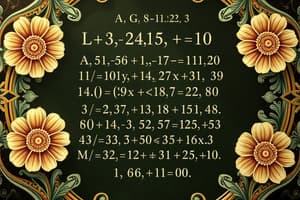Podcast
Questions and Answers
क्या एल्जेब्रा का मुख्य उद्देश्य है?
क्या एल्जेब्रा का मुख्य उद्देश्य है?
- प्रायोगिक समस्याओं का समाधान करना
- साइज और आकार के बारे में जानकारी देना
- मिसिंग मान ढूंढना (correct)
- त्रिकोणमिति का अध्ययन करना
जब हमें पता हो कि 3x का मान 11 है, तो x की मान होगी?
जब हमें पता हो कि 3x का मान 11 है, तो x की मान होगी?
- $3$
- $\frac{11}{3}$ (correct)
- $\frac{3}{11}$
- $11$
कौन-सी संस्कृति ने एल्जेब्रा के विकास में महत्वपूर्ण योगदान दिया?
कौन-सी संस्कृति ने एल्जेब्रा के विकास में महत्वपूर्ण योगदान दिया?
- ग्रीक
- बैबिलोनियन (correct)
- हिंदू-अरबी
- मिस्री
कौन-सी संस्कृति ने हायरोग्लीफिक संख्याओं और शून्य की अवधारणा विकसित की?
कौन-सी संस्कृति ने हायरोग्लीफिक संख्याओं और शून्य की अवधारणा विकसित की?
'x= \frac{11}{3}' होने पर '3x - 2' का मान होगा?
'x= \frac{11}{3}' होने पर '3x - 2' का मान होगा?
'समुल्य 0' की अवधारणा कहाँ विकसित हुई?
'समुल्य 0' की अवधारणा कहाँ विकसित हुई?
किस शाखा में प्राथमिक बीजगणित के अवधारणाओं को पेश किया जाता है?
किस शाखा में प्राथमिक बीजगणित के अवधारणाओं को पेश किया जाता है?
किसके द्वारा 'एलिजेब्रा' शब्द का उपयोग किया गया था?
किसके द्वारा 'एलिजेब्रा' शब्द का उपयोग किया गया था?
किस सम्राट ने दो पुस्तकें लिखीं जिनमें समकर्ण समीकरणों को हल करने की तकनीक विकसित की?
किस सम्राट ने दो पुस्तकें लिखीं जिनमें समकर्ण समीकरणों को हल करने की तकनीक विकसित की?
'सार्वत्रिक एलिजेब्रा' में कौन-कौन समावेश होता है?
'सार्वत्रिक एलिजेब्रा' में कौन-कौन समावेश होता है?
'सांकेतिक' क्रियाओं के मुख्यत: उपयोग होता है:
'सांकेतिक' क्रियाओं के मुख्यत: उपयोग होता है:
'संरेखीय समीकरणों' के माध्यम से कौन-से प्रकार के प्रॉब्लमस हल होते हैं?
'संरेखीय समीकरणों' के माध्यम से कौन-से प्रकार के प्रॉब्लमस हल होते हैं?
Flashcards
What is Algebra?
What is Algebra?
Branch of math studying relationships between variables/constants using symbols, operations, equations and relations.
Who was al-Khwarizmi?
Who was al-Khwarizmi?
Arab mathematician who coined the term 'algebra' around AD 825, meaning 'reuniting of broken parts'.
What is elementary algebra?
What is elementary algebra?
An area of algebra that introduces basic concepts such as variables, coefficients, expressions, and equations.
What is linear algebra?
What is linear algebra?
Signup and view all the flashcards
What is abstract algebra?
What is abstract algebra?
Signup and view all the flashcards
What are variables in algebra?
What are variables in algebra?
Signup and view all the flashcards
How to solve algebraic equations?
How to solve algebraic equations?
Signup and view all the flashcards
What was the contribution of Egyptians to algebra?
What was the contribution of Egyptians to algebra?
Signup and view all the flashcards
What was the contribution of Greeks to algebra?
What was the contribution of Greeks to algebra?
Signup and view all the flashcards
What was the role of India in developing algebra?
What was the role of India in developing algebra?
Signup and view all the flashcards
How is algebra useful?
How is algebra useful?
Signup and view all the flashcards
Study Notes
Mathematics: Algebra Overview
Algebra is an essential branch of mathematics that involves the study of abstract relationships between variables and constants through the use of symbols, operations, equations, and relations. Its history dates back to ancient civilizations like Babylonians, Egypt, Greeks, and Indians who used it in various fields such as astronomy, navigation, and land surveying. However, the term 'algebra' was coined by the Arab mathematician al-Khwarizmi around AD 825 from the word meaning 'reuniting of broken parts'. He wrote two books on the subject and developed techniques to solve quadratic equations.
The field of algebra can be further divided into several areas:
-
Elementary Algebra: This introduces basic concepts such as variables, coefficients, expressions, and equations. It teaches how to manipulate these elements using operations like addition, subtraction, multiplication, division, and exponentiation.
-
Linear Algebra: A more advanced area within algebra, linear algebra deals with systems of linear equations and their solutions. It also covers matrices and vector spaces.
-
Abstract Algebra: Deals with generalized structures that contain sets with binary operations. These operations must satisfy certain laws, similar to those satisfied by numbers under arithmetic operations.
In algebra, one learns to work with unknown quantities represented by letters of the alphabet, usually lowercase ones like 'a', 'x', or 'y'. In contrast to geometry where things have size and shape, in algebra problems often involve finding missing values based solely on relationships between variables.
For example, consider the equation (3x - 2 = 7) in elementary algebra. Here, we don't know the value of x yet but we do know that (3x) is equal to (9 + 2), which means that (3x) equals (11). Solving for x requires working backwards, rearranging terms until you get what you want: (x= \frac{11}{3}).
Throughout history, different cultures contributed significantly to the development of algebra. The Babylonians used it for solving practical problems related to agriculture, while the Egypt developed hieroglyphic numerals and the concept of zero. The Greeks started using Greek letter names for variables but did not develop any formal theory of equations. In India, algebra played a crucial role in the development of Hindu-Arabic numerals and their propagation across Europe via Islamic scholars during the Middle Ages.
Today, algebra is taught as a fundamental part of K-12 math education worldwide. It forms the foundation for many higher level mathematical disciplines such as calculus, trigonometry, statistics, and probability. Understanding algebra helps students develop critical thinking skills needed for success beyond high school.
Studying That Suits You
Use AI to generate personalized quizzes and flashcards to suit your learning preferences.




